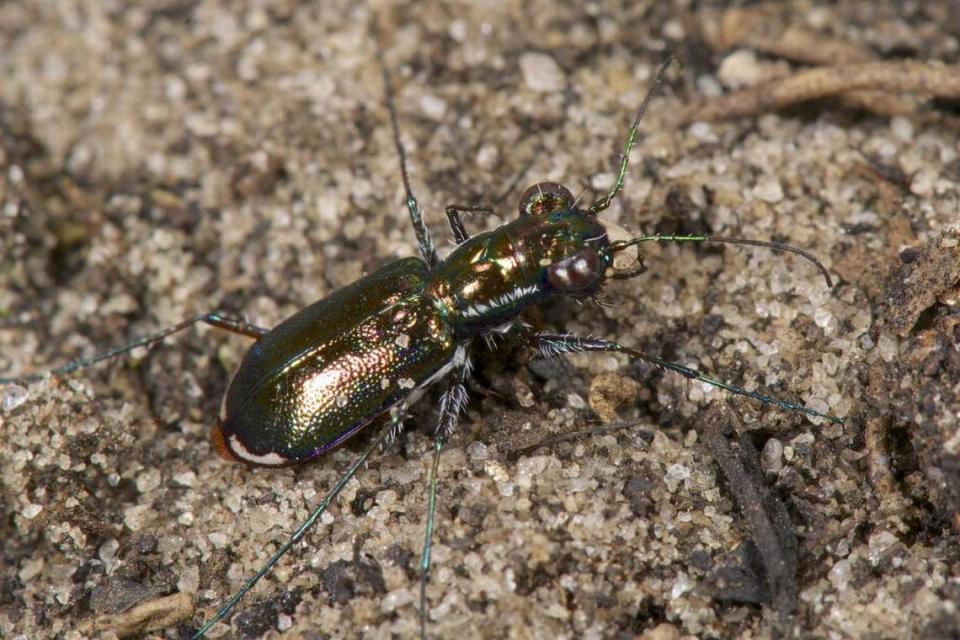Activists get more time to protest Miami Wilds water park in endangered bat habitat
Activists will have more time to pressure county commissioners and developers to scrap plans to build a controversial water park in the same habitat where endangered bats, beetles and butterflies live.
A vote by the Miami-Dade County Commission on the lease for Miami Wilds, a 27.5-acre park slated for county land on a portion of Zoo Miami’s parking lot, was postponed to Oct. 20. It was originally scheduled for next week’s meeting on Oct. 6.
Environmentalists have mounted a campaign in recent weeks to convince commissioners that the land is environmentally sensitive, surrounded by rare Pine Rockland forest and home to at least four endangered species: the Florida bonneted bat, the Miami tiger beetle and at least two species of butterflies.

The $120 million, 40-year lease agreement for the Miami Wilds project, which was supported by voters in a 2006 referendum, was approved by the county’s Parks, Recreation, and Cultural Affairs Committee earlier this month. It includes a water park, a 200-room hotel and shops.
Developers and the county are still working on an estimated entrance fee for the planned park that includes an artificial beach and was downsized from an original project that was designed as a massive theme park featuring rides based on 20th Century Fox movies such as Rio and Ice Age. Plans were scaled down over the years to consider environmental concerns such as endangered species that are known to use that habitat.
Supporters including commissioner Dennis Moss, who has sponsored the project and must vacate his seat next month due to term limits. He said Miami Wilds will create jobs and give South Dade “a cool and refreshing” entertainment option for those who can’t get to the beach easily.
But conservationists say developers should look elsewhere in the county for space to build the project as preserving some of the last patches of an ecosystem that doesn’t exist anywhere else in the world is more valuable for Miami-Dade residents.
“We have this rare forest right in our backyard, with several endemic and endangered species that depend on it for their survival. We are not against development; but we want the commissioners to know that we are aware of the endangered species in this location and we know they are entitled to protections under the Endangered Species Act,” said Abigail Merolle, an environmental studies student at Florida International University.
She has given Power Point presentations to over 160 fellow FIU students over the past two weeks to spread the word about the pine rocklands and its threatened inhabitants, and to rally support for actions like bombarding commissioners with emails and phone messages raising concern about Miami Wilds. Merolle also set up a petition that got more than 500 signatures in less than a week, joining a chorus of environmentalists opposing the project on the grounds of its environmentally sensitive location.
Tropical Audubon Society, Bat Conservation International and the Center for Biological Diversity are some of the organizations that are calling on supporters to tell commissioners to protect the area even if it has been paved over by a parking lot. With only a few slivers of pine rockland left outside of Everglades National Park, activists say no parcel is too small to be preserved, and that even developed areas can be recovered.
“Every acre counts,” said Jose Francisco Barros, president of Tropical Audubon Society. “There is clear scientific evidence that both the federally endangered Florida bonneted bat and the Miami tiger beetle have used the site extensively, both historically and as recently as last year.”
In late 2018, Bat Conservation International and other organizations installed six custom roosting boxes at Zoo Miami to support the species’ recovery. Within the following six months, all six roosts were occupied by bonneted bats.
BCI used bat detectors for six months last year between May and November to detect the sound waves bats produced to echolocate while flying around the proposed development area. Bats were detected on 103 out of 105 nights monitored.
Residents in the surrounding areas also want the county to protect the land near the zoo, which they said is scientifically proven to be environmentally sensitive. The Kendall Federation of Homeowner Associations, for example, is calling on Florida City and Homestead to propose new locations for a water park.
“We support siting a water park further south of the pine rocklands, including the original concept of a 130-plus acre theme park that will truly be the envy of the country, rather than the scaled-down miniaturized version that is being proposed, so long as it is located on land that is not environmentally sensitive,” Michael Rosenberg, president of the federation, wrote in a letter to county commissioners last week.
“Instead of building a baby pool in the pine rocklands, let’s build the Jurassic Park of water parks further south,” he said in an email.

